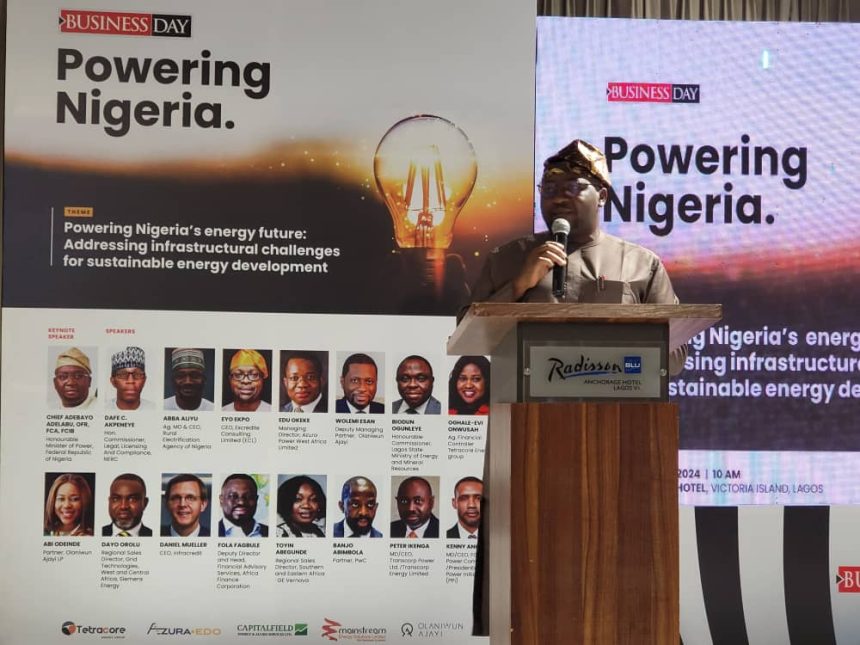The federal government has given the assurance that by addressing the energy sector’s infrastructure challenges and embracing sustainable energy development, it would not only meet the nation’s current needs but also create the avenue for a prosperous and resilient Nigeria.
The Minister of Power, Adebayo Adelabu, made this declaration while speaking on the theme, “Powering Nigeria’s Energy Future” on Friday at the BusinessDay Energy Conference held in Lagos.
He said although the path to powering Nigeria’s energy future was filled with challenges, it was a journey that must be undertaken with determination and vision.
His words: “Our efforts today will lay the foundation for a viable and sustainable power sector for all Nigerians. By addressing the sector’s infrastructure challenges and embracing sustainable energy development, we are not only meeting our current needs but also paving the way for a prosperous and resilient nation.”
He said in a world where energy was the cornerstone of all economic activities, Nigeria’s quest for sustainable development would rely on the ability to tackle the challenges within the power infrastructure of the country.
He said the important role of sustainable energy development in the country could not be over-emphasised.
He said it was therefore necessary for Nigeria to harness the abundant resources Nigeria is blessed with.
The minister said sustainable energy development for the country was not just ensuring a stable power supply, but involved creating an energy system that “is resilient, efficient, and environmentally friendly.”
Adelabu spoke on the efforts by the federal government to improve the energy sector in the last one year, just as he pointed out that remarkable achievements were gradually being recorded.
Said he: “To address the Nigeria power sector infrastructure challenges, the government has embarked on several strategic initiatives designed to enhance sustainable energy development both in the short-term and long-term aimed at transforming our energy sector.
“To address our generation capacity, we are committed to both enhancing current generating asset and investing in new power plants. Our focus is on harnessing the rich diversity of our natural resources, from hydro to solar and beyond. Recently, generation capacity to the grid has been expanded with the addition of 700MW newly commissioned Zungeru hydropower plant. We have also secured Presidential approval to defray legacy debts to gas companies to allow efficient gas supply to the power sector going forward and a payment mechanism to address Generation Companies debts to ensure necessary maintenance are resolved and evacuation capacity optimization. With this effort, we aim to not only increase our generation capacity but also improve the efficiency and reliability of our power supply.
“To ensure the upgrade of our transmission and distribution networks. We are actively working through the Presidential Power Initiative on expanding our transmission grid to ensure it can handle the increased load from our new generation sources. Simultaneously, we are supporting efforts targeted at modernizing our distribution networks to reduce losses and improve the quality of power delivered to consumers. In the last one-year, an additional 463MW transmission evacuation capacity has been added to the grid through this initiative. This was made possible through the signing of an accelerated performance agreement in Nov 2023 supervised by President Bola Ahmed Tinubu and German Chancellor Olaf Scholz. Additionally, the government has put in place the required framework to enable an injection of 1.5 million meters into the power sector through the World Bank Distribution Support Recovery Program. The Presidential Metering Initiative will ensure an additional 2 million meters will be procured annually for 5 years. This will ensure accurate billing, reducing revenue loss and improving cash flow for a more liquid power sector.”
READ ALSO: Chrisland: Whitney visited hospital before inter-house sports –Witness
He added that in its bid to promote renewable energy penetration and off-grid solution, the federal government was about to commence the World Bank Distributed Access through Renewable Energy Scale-up (DARES) $750 million facility to increase access to electricity for 2.5 million people through deployment of solar home systems and mini grids to households, MSMEs throughout Nigeria, educational and health facilities.
That, according to him, would be in addition to the recently concluded $550m Nigeria Electrification Plan which had bridged the energy access deficit by providing electricity to over 1.1 million households, MSMEs, educational and healthcare facilities in unserved and underserved rural communities.
He said the government believed that the global shift towards renewable energy was not just an environmental necessity but an economic one.
“Nigeria is blessed with abundant renewable resources, and we aim to continue tapping into these renewable sources to diversify our energy mix, reduce our carbon footprint, and ensure energy security,” the minister said.
He added that to ensure the sector’s policy and regulatory framework was aligned and enhanced, the government had commenced the development of a National Electricity Policy and Strategic Implementation Plan to provide a comprehensive framework for the nation’s electricity sector to support innovation, research, and development in the sector and chart a sustainable path forward in Nigeria’s electricity industry.
He said the government also believed that a supportive policy and regulatory environment were essential for sustainable energy development and that it was committed to creating policies that encouraged investment, foster innovation, and ensure fair competition in the energy sector.
“We are beginning to see some progress from the outcome of government’s initiative in the last one year. However, we will not relent until we have a resilient and efficient electricity sector that meets the needs of all Nigerians,” the minister enthused.














